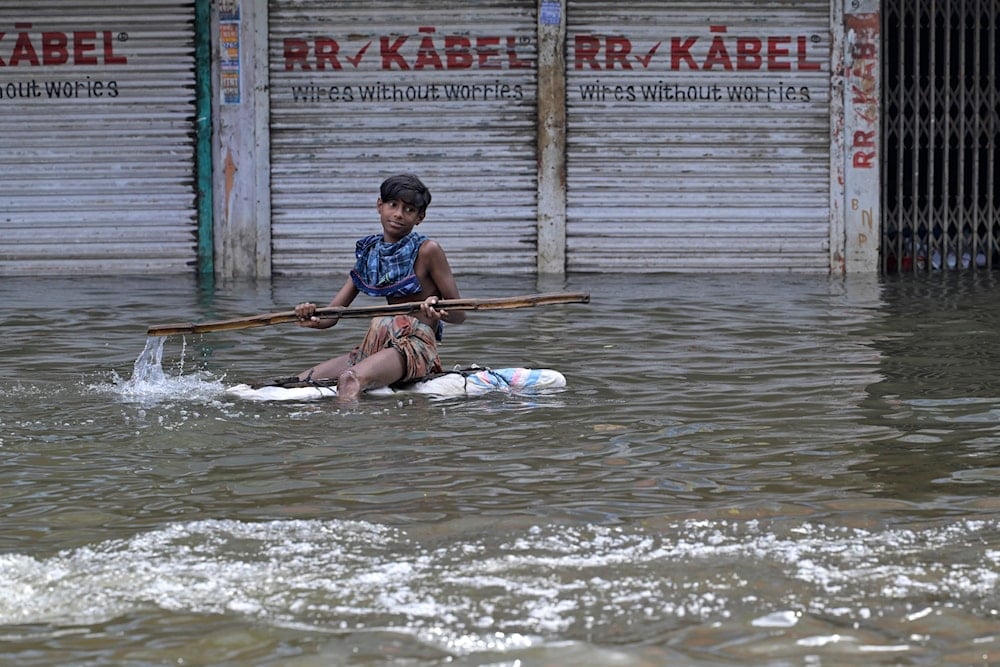300,000 Bangladeshis seek shelter as floods swamp country
Hundreds of thousands of people in Bangladesh have rushed to emergency and relief shelters as floods take over the city of Feni.
-

A young boy uses a bamboo to steer himself floating on a log of wood through a flooded street in Feni, a coastal district in southeast Bangladesh, Saturday, Aug. 24, 2024. (AP)
Almost 300,000 Bangladeshis rushed to emergency shelters on Sunday amid floods that swamped the country, disaster officials said.
The floods, caused by heavy monsoon rains, resulted in the deaths of at least 42 people across Bangladesh and India since the start of the week. Many casualties were caused by the consequent landslides.
Lufton Nahar, 60, was fortunate enough to arrive at a relief shelter in Feni, one of the worst-hit districts near the border with India's Tripura state. He told AFP that his house was entirely flooded. "Water is flowing above our roof. My brother brought us here by boat. If he hadn't, we would have died."
Damage to highways and railways between the capital of Dhaka, and the major port city of Chittagong has hindered access to heavily flooded areas and disrupted business operations.
Cox's Bazar, a district housing about a million Rohingya refugees from Myanmar, is one of the areas most severely impacted.
Sarat Kumad Das, a Tripura state disaster agency official, told AFP that 24 people have died on the Indian side of the border since Monday. In Bangladesh, disaster management ministry secretary Md Kamrul Hasan reported that 18 people have been killed.
With a population of 170 million, Bangladesh is among the most vulnerable countries to both disasters and the impacts of climate change, according to the Global Climate Risk Index, especially due to its hundred rivers and frequent, recurring floods within the last few decades.
The overall region is susceptible to such disastrous incidents where an annual monsoon rain causes widespread damage every year. However, due to climate change, there is an increase in extreme weather events and shifting patterns.
Bangladesh accuses India of 'creating the flood' and its political turmoil
The majority of Banglesh's geography is made up of deltas where the Himalayan rivers, the Ganges, and the Brahmaputra, flow towards the sea after passing through India.
The Indian Foreign Ministry rejected accusations made by some in Bangladesh that it was responsible for the floods, denying it had intentionally released water from an upstream dam.
The Ministry attributed this phenomenon to the catchment area experiencing "heaviest rains of this year over the last few days", and that the downstream flow was due to "automatic releases."
Asif Mahmud, the key organizer of the recent student-led anti-quota protests and newly appointed sports minister in the interim cabinet, accused India of not only supporting and sheltering former Prime Minister Sheikh Hasina but of deliberately "creating a flood."
"Floods on the common rivers between India and Bangladesh are a shared problem inflicting sufferings to people on both sides, and requires close mutual cooperation towards resolving them," New Delhi's foreign ministry said in a statement denying Mahmud's accusations.
The floods come after two months of political unrest in the country with violent protests and nationwide police crackdowns imposed by Hasina in response to anti-quota protests.

 3 Min Read
3 Min Read








